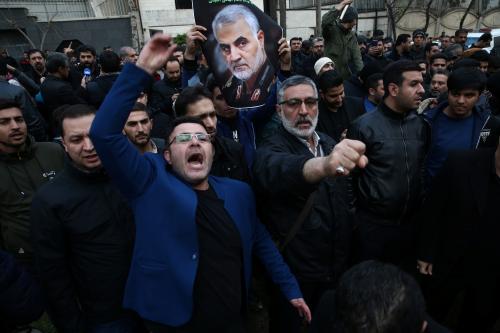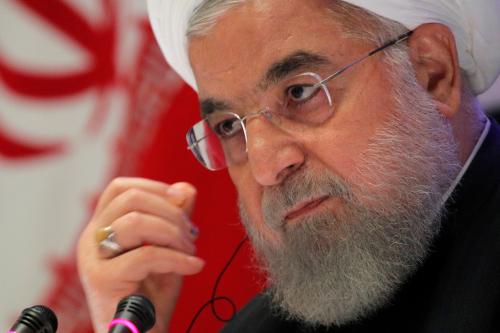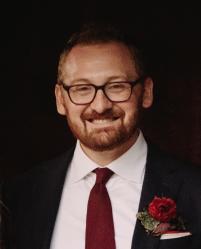If you’re a reporter, sign up here to receive emails for future on-the-record media calls with Brookings experts.
Following the killing of Iranian Maj. Gen. Qassem Soleimani on January 3, 2020 in a U.S. airstrike at Baghdad International Airport, Brookings experts Suzanne Maloney, Daniel Byman, and Scott Anderson joined an on-the-record call with reporters to discuss the ramifications.
 Suzanne Maloney (@MaloneySuzanne), Interim Vice President and Director of the Brookings Foreign Policy program: “…It’s important to know that the Iranians have demonstrated a pretty well practiced art of calibrating their retaliation around their real interests, which ultimately concerns regime survival. They will try to target their reprisals with some degree of deliberation and precision. You can look back historically, [and see that] Iran has actually absorbed some major blows and setbacks [without] immediately yielding the temptation to strike back in some kind of reckless fashion. They are very good at nurturing resentments, biding their time…”
Suzanne Maloney (@MaloneySuzanne), Interim Vice President and Director of the Brookings Foreign Policy program: “…It’s important to know that the Iranians have demonstrated a pretty well practiced art of calibrating their retaliation around their real interests, which ultimately concerns regime survival. They will try to target their reprisals with some degree of deliberation and precision. You can look back historically, [and see that] Iran has actually absorbed some major blows and setbacks [without] immediately yielding the temptation to strike back in some kind of reckless fashion. They are very good at nurturing resentments, biding their time…”
Learn more about a new Brookings book edited by Suzanne Maloney, “The Iranian Revolution at Forty” »
 Daniel Byman (@dbyman), Senior Fellow in the Center for Middle East Policy: “…I’m very concerned that there may have been a lack of fore-thinking [or] advanced planning with regard to this operation. This is a game-changing operation. It may be the right move…if U.S. forces were in immediate danger. But it’s something that dramatically re-calibrates a lot of our thinking about the response of the regions. And if so, it’s going to require the United States to be thinking about the long term, to be thinking about what it wants to achieve in the region. And so far this administration has had very grandiose, very big rhetoric, but has actually tried to reduce the U.S. role in the region. And, what they’ve done right now is made a very big play and I’m worried they’re making it with a very weak hand…”
Daniel Byman (@dbyman), Senior Fellow in the Center for Middle East Policy: “…I’m very concerned that there may have been a lack of fore-thinking [or] advanced planning with regard to this operation. This is a game-changing operation. It may be the right move…if U.S. forces were in immediate danger. But it’s something that dramatically re-calibrates a lot of our thinking about the response of the regions. And if so, it’s going to require the United States to be thinking about the long term, to be thinking about what it wants to achieve in the region. And so far this administration has had very grandiose, very big rhetoric, but has actually tried to reduce the U.S. role in the region. And, what they’ve done right now is made a very big play and I’m worried they’re making it with a very weak hand…”
Learn more about Daniel Byman’s book, “Road Warriors: Foreign Fighters in the Armies of Jihad” »
 Scott Anderson (@S_R_Anders), David M. Rubenstein Fellow in the Governance Studies program: “…It definitely seems like this is an action that pushes the envelope in a number of regards, both on a domestic and international law. I’m not sure that describing it as illegal or unlawful is necessarily correct, because the legal questions tend to be defused through a highly deferential lens to the executives. And [they] involve legal authorities that are subject to a great deal of executive branch interpretation, but it certainly goes a bit further than this administration has indicated it intended to go in a variety of dimensions…”
Scott Anderson (@S_R_Anders), David M. Rubenstein Fellow in the Governance Studies program: “…It definitely seems like this is an action that pushes the envelope in a number of regards, both on a domestic and international law. I’m not sure that describing it as illegal or unlawful is necessarily correct, because the legal questions tend to be defused through a highly deferential lens to the executives. And [they] involve legal authorities that are subject to a great deal of executive branch interpretation, but it certainly goes a bit further than this administration has indicated it intended to go in a variety of dimensions…”








Commentary
Brookings experts comment on the killing of Iranian commander Qassem Soleimani
January 4, 2020